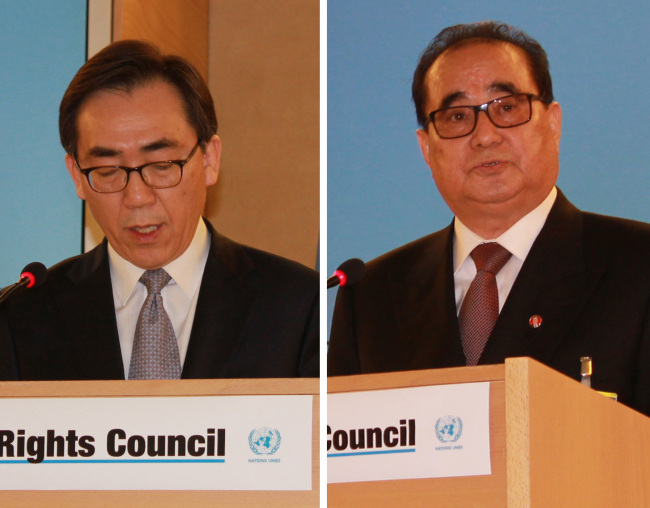South Korea on Tuesday urged the North to take action to improve its human rights situation, lambasting its ongoing attempt to undermine a landmark U.N. study in the wake of a defector’s changes in his account.
Speaking at the U.N. Human Rights Council in Geneva, Vice Foreign Minister Cho Tae-yul called on the international community to provide “special care and protection” to North Korean asylum seekers, taking a veiled swipe at China for deporting them despite the harsh punishment they face back home.
“One cannot veil the sky with the palm of a hand. Darkness can never defeat light. How much longer does the DPRK wish to continue its inhumane acts of trampling on the human dignity of its people?” he said at a high-level segment of the council’s 28th session, which kicked off Monday for a four-day run. He was using the official name of the communist country, the Democratic People’s Republic of Korea.
Speaking at the U.N. Human Rights Council in Geneva, Vice Foreign Minister Cho Tae-yul called on the international community to provide “special care and protection” to North Korean asylum seekers, taking a veiled swipe at China for deporting them despite the harsh punishment they face back home.
“One cannot veil the sky with the palm of a hand. Darkness can never defeat light. How much longer does the DPRK wish to continue its inhumane acts of trampling on the human dignity of its people?” he said at a high-level segment of the council’s 28th session, which kicked off Monday for a four-day run. He was using the official name of the communist country, the Democratic People’s Republic of Korea.

While North Korean Foreign Minister Ri Su-yong was present, Cho criticized his earlier speech ― in which Ri claimed falsehood of the U.N. Commission of Inquiry report ― calling it a “pitiful effort born out of desperation.”
“The minister knows better than anyone else about the horrific human rights situation in the DPRK and the grave concern verging on despair of the international community over the situation,” Cho said.
“We call on the DPRK to immediately take concrete and sincere steps so that its people can carry on a normal, dignified life.”
Unveiled last February, the 400-page document chronicled harrowing accounts from defectors and witnesses of “systematic, widespread and gross” rights breaches including rape, murder and torture in the reclusive country, which it concluded constitute crimes against humanity.
The report laid the foundation for watershed resolutions passed last year by the 47-member council and the U.N. General Assembly, calling for the culprits to be held accountable.
Shortly before Cho’s address, Ri argued that the COI study should be nullified given a recent renunciation of some testimony by Shin Dong-hyuk, a high-flying North Korean defector and core witness in the survey.
Ri condemned defectors as “human scum who committed crimes, abandoned their parents, spouses and children and ran away,” while asserting that the U.N. is growing “impartial” as a big countries rally their followers to “haze” disobedient ones.
The North’s mission to the U.N. in Geneva has in recent months circulated a series of letters refuting criticism over its rights record among member states in an apparent effort to water down a forthcoming council resolution to be adopted at the end of the session later this month.
In a February dispatch, it said that following Shin’s confession, the basis for last year’s General Assembly text has “collapsed and proves the utterly unjust nature of the U.S. and other hostile forces’ act” of bringing in refugees to the U.N.
Dismissing the claim, Cho praised them for “breaking the imposed silence,” calling for the world to comply with the principle of non-refoulement, which forbids repatriating victims of persecution.
China has taken flak for sending back North Korean defectors, whom it calls “illegal economic migrants,” though they face torture, labor camps or even death upon return.
“Even at this moment, North Korean asylum seekers are wandering around searching for freedom,” the vice minister said.
“All members of the international community should adhere to the principle of non-refoulement, and spare no efforts to provide protection and assistance so that they can settle down safely in a place of their choice.”
Highlighting the plight of the so-called comfort women under the frame of sexual violence in conflict, Cho urged Tokyo to resolve the longstanding row with Seoul through a “genuine apology and accountability.”
“We cannot further delay investing all that we can to help the surviving victims restore their dignity and self-esteem,” he added.
“The past mirrors the present and the future. Without healing the wounds of the past, we cannot anticipate a healthy future.”
By Shin Hyon-hee (heeshin@heraldcorp.com)




![[Herald Interview] 'Amid aging population, Korea to invite more young professionals from overseas'](http://res.heraldm.com/phpwas/restmb_idxmake.php?idx=644&simg=/content/image/2024/04/24/20240424050844_0.jpg&u=20240424200058)












![[KH Explains] Korean shipbuilding stocks rally: Real growth or bubble?](http://res.heraldm.com/phpwas/restmb_idxmake.php?idx=652&simg=/content/image/2024/04/25/20240425050656_0.jpg&u=)

